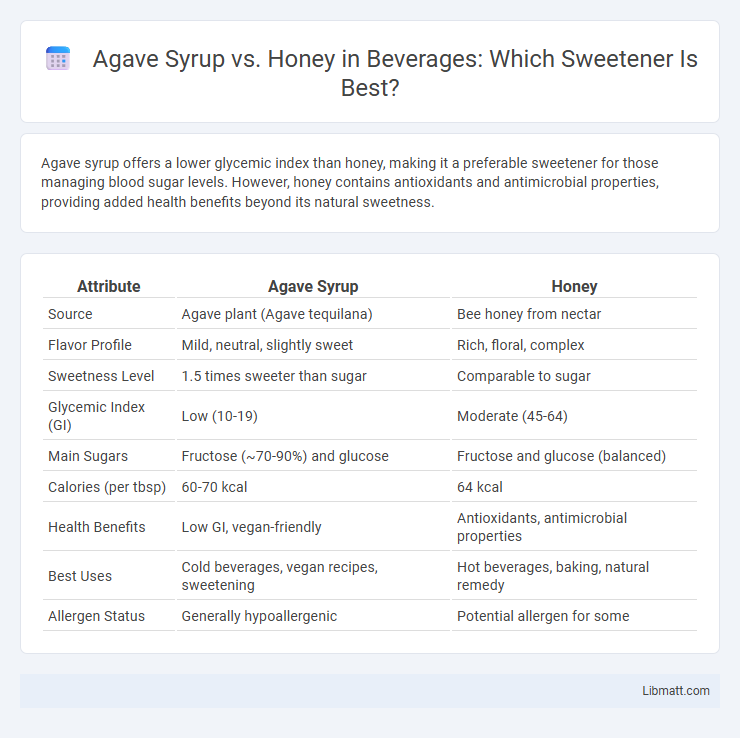Agave syrup offers a lower glycemic index than honey, making it a preferable sweetener for those managing blood sugar levels. However, honey contains antioxidants and antimicrobial properties, providing added health benefits beyond its natural sweetness.
Table of Comparison
| Attribute | Agave Syrup | Honey |
|---|---|---|
| Source | Agave plant (Agave tequilana) | Bee honey from nectar |
| Flavor Profile | Mild, neutral, slightly sweet | Rich, floral, complex |
| Sweetness Level | 1.5 times sweeter than sugar | Comparable to sugar |
| Glycemic Index (GI) | Low (10-19) | Moderate (45-64) |
| Main Sugars | Fructose (~70-90%) and glucose | Fructose and glucose (balanced) |
| Calories (per tbsp) | 60-70 kcal | 64 kcal |
| Health Benefits | Low GI, vegan-friendly | Antioxidants, antimicrobial properties |
| Best Uses | Cold beverages, vegan recipes, sweetening | Hot beverages, baking, natural remedy |
| Allergen Status | Generally hypoallergenic | Potential allergen for some |
Nutritional Comparison: Agave Syrup vs Honey
Agave syrup contains approximately 60 calories per tablespoon and is high in fructose, which has a lower glycemic index (around 15) compared to honey's index of 58, making it a better option for blood sugar management. Honey provides more nutrients, including antioxidants, vitamins like B6, and minerals such as calcium and iron, while agave syrup is primarily composed of sugars with minimal vitamins or minerals. Your choice depends on whether you prioritize lower glycemic impact from agave syrup or richer nutritional content from honey.
Glycemic Index: Which Is Better for Blood Sugar?
Agave syrup has a lower glycemic index (GI) of approximately 10 to 19, making it a preferable option for blood sugar control compared to honey, which typically has a GI around 45 to 64. The lower GI of agave syrup results from its high fructose content, causing slower glucose absorption and less pronounced blood sugar spikes. Individuals managing diabetes or insulin resistance may benefit from choosing agave syrup over honey due to its milder impact on glycemic response.
Caloric Content and Sweetness Levels
Agave syrup contains approximately 60 calories per tablespoon, while honey has about 64 calories, making agave slightly lower in caloric content. Agave syrup's sweetness level is higher due to its fructose content, often perceived as 1.4 to 1.6 times sweeter than honey. This means less agave syrup can be used to achieve the same sweetness, potentially reducing overall calorie intake in recipes.
Health Benefits of Agave Syrup
Agave syrup is a natural sweetener derived from the agave plant, offering a lower glycemic index than traditional sugar and honey, which helps stabilize blood sugar levels. Rich in fructose, it provides a sweeter taste with less quantity needed, potentially supporting weight management when used in moderation. Your choice of agave syrup can benefit digestive health by containing inulin, a prebiotic fiber that promotes gut bacteria growth.
Health Benefits of Honey
Honey offers powerful health benefits due to its rich antioxidant content, including flavonoids and phenolic acids, which help reduce inflammation and support immune function. Its natural antibacterial and antimicrobial properties can promote wound healing and soothe sore throats effectively. If you seek a natural sweetener with added health advantages beyond simple calories, honey serves as a superior choice compared to agave syrup.
Processing and Production Methods
Agave syrup is produced by extracting sap from the agave plant, then filtering and heating it to convert complex carbohydrates into simple sugars, resulting in a sweet, liquid form with a low glycemic index. Honey is created by bees collecting nectar from flowers, which is enzymatically broken down and dehydrated within the hive to produce a thick, natural sweetener rich in enzymes and trace antioxidants. The key difference lies in agave syrup's industrial processing versus honey's natural enzymatic transformation within the beehive.
Vegan and Dietary Considerations
Agave syrup is a popular vegan alternative to honey since it is derived from the agave plant and contains no animal products, making it suitable for strict plant-based diets. Honey, while naturally produced by bees and rich in antioxidants, is often avoided by vegans due to ethical concerns related to bee exploitation. When choosing a sweetener for your dietary needs, consider agave syrup for a lower glycemic index and honey for natural enzyme content, depending on your nutritional preferences and ethical choices.
Culinary Uses and Flavor Profiles
Agave syrup, derived from the agave plant, offers a mild, neutral sweetness ideal for beverages, baking, and salad dressings, while honey provides a rich, floral flavor profile that enhances desserts, marinades, and teas. Agave syrup dissolves quickly in cold liquids, making it a preferred natural sweetener for smoothies and cocktails, whereas honey's thicker texture and distinct taste complement baked goods and savory dishes. Both sweeteners bring unique culinary applications, with agave favored for subtle sweetness and honey prized for its complex, aromatic depth.
Environmental Impact of Agave and Honey
Agave syrup production requires significantly less water and land compared to honey, making it a more sustainable option in arid regions where agave plants thrive. Honey production supports bee populations, which are crucial for pollination and biodiversity but can be affected by large-scale commercial beekeeping practices. Environmentally, choosing between agave syrup and honey depends on balancing water usage, land impact, and the preservation of pollinator ecosystems.
Choosing the Right Sweetener for You
Agave syrup contains a higher fructose content, making it sweeter and lower on the glycemic index compared to honey, which has more glucose and offers additional antioxidants and nutrients. Your choice depends on dietary needs, such as managing blood sugar levels, where agave might be preferable, or seeking a natural source with potential health benefits, favoring honey. Both sweeteners provide distinct flavors and nutritional profiles, so selecting the right one aligns with your taste preferences and health goals.
Agave syrup vs honey Infographic

 libmatt.com
libmatt.com